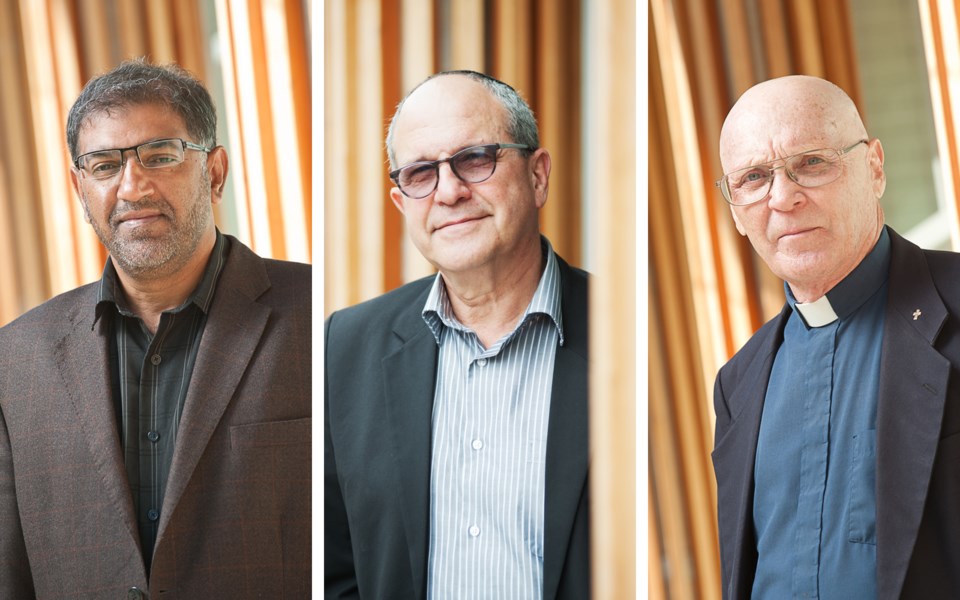The rabbi put a fine point on it. In today’s world, for religious leaders of the three Abrahamic faiths to come together in an enjoyable, peaceful and collegial discussion is a rare thing.
His audience of about two dozen, including two Muslim scholars, a Catholic priest and the rabbi, met at UBC’s Jewish campus centre, Hillel House, last week. They got together to discuss fasting in each of their religions, days before the Muslim holy month of Ramadan ushered in 30 days of fasting from dawn to dusk.
Dr. Nasir Zaidi, UBC’s Muslim chaplain, says that restraining from eating and drinking from sunrise until sunset is more a philosophical, ethical and spiritual undertaking than a physical one.
“We are imperfect,” he says. “We are impure.” To confront problems in life and in individual characters, willpower is necessary, he says.
“Fasting can be very powerful to strengthen our willpower and discipline,” he says. Experiencing hunger also encourages the person fasting to experience something like the problems faced by people in need.
During Ramadan, food and drink are taken after sundown and before sunrise — but there is another mystical aspect that goes beyond the mouth. The eyes, the ears, the tongue and the hands are also fasting, Zaidi says. The idea is to eliminate the extraneous and as much as possible that is not divine during this month, Zaidi says.
“Our lives should have divine colour,” he says.
Dr. Akbar Mithani, a Muslim scholar and also a family physician specializing in geriatrics, said many Muslim patients seek medical advice in advance of Ramadan to ensure that it is safe to fast, particularly when the holy month falls at this time of year, when long days and short nights mean fasting lasts about 18 hours. Muslims who are elderly, pregnant or with chronic illnesses like diabetes face a choice.
“Many of them want to fast, but they’re scared of fasting,” Mithani says. The decision on exempting from fasting always rests with the individual, he stresses. But he also emphasizes that non-Muslim doctors might fall on the side of caution and discourage Muslim patients from fasting.
Doctors must address physical as well as spiritual needs in their patients, he says, and fasting during Ramadan is an important component of Muslim spirituality. He says doctors have a responsibility to help patients with the physical side of fasting so that they can benefit from the spiritual side.
“To just think of fasting as a physical component is basically to not understand fasting,” Mithani says.
Father Michael Stogre, UBC’s Roman Catholic chaplain and pastor at St. Mark’s Church on campus, said fasting and almsgiving — charity — are deeply entwined in Christianity.
In Catholic tradition, fasting precedents are founded on the story of Moses fasting 40 days at Sinai and Jesus fasting 40 days while struggling with temptation. The Christian holy period of Lent is the 40 days leading to Easter and, while few Catholics have a “black fast,” total abstinence from food and drink, it remains common to give up something. The religious will sometimes rely only on bread and water.
Stogre says that true biblical fasting is not a matter of just giving things up, but also helping others. For example, money saved from Lenten self-denial is donated to good causes, a tradition he sums up as “spare, then share.”
Rabbi Philip Bregman, executive director of Hillel and Jewish chaplain at UBC, says fasting in ancient Jewish tradition was common before services in the Temple at Jerusalem, by people hoping for fertility, or when a king died.
“Most of these have gone by the wayside,” he says, but Judaism still has a number of fasts. One of Judaism’s solemn fast days, Tisha b’Av, takes place next month and mourns the destruction of the two historic temples in Jerusalem and the subsequent exiles of the Jewish people from Israel, on the same day 655 years apart.
“The giving up of something lets me walk in those shoes and understand what it’s like to do without,” Bregman says. But it is also an opportunity to put aside some daily things and concentrate on who he is and on the things that are most important.
Closing remarks by the host-rabbi reminded all in attendance how rare — indeed, dangerous, as the news reflects daily — such gatherings would be in a great number of places in the world. What we take for granted with a meeting of Christians, Muslims and Jews on a Vancouver campus is “a total anathema” in other places, and Bregman says that small gatherings like this one are “an example to the world that we as children of this creator are providing an example of how we can agree, disagree, share and take away.”



